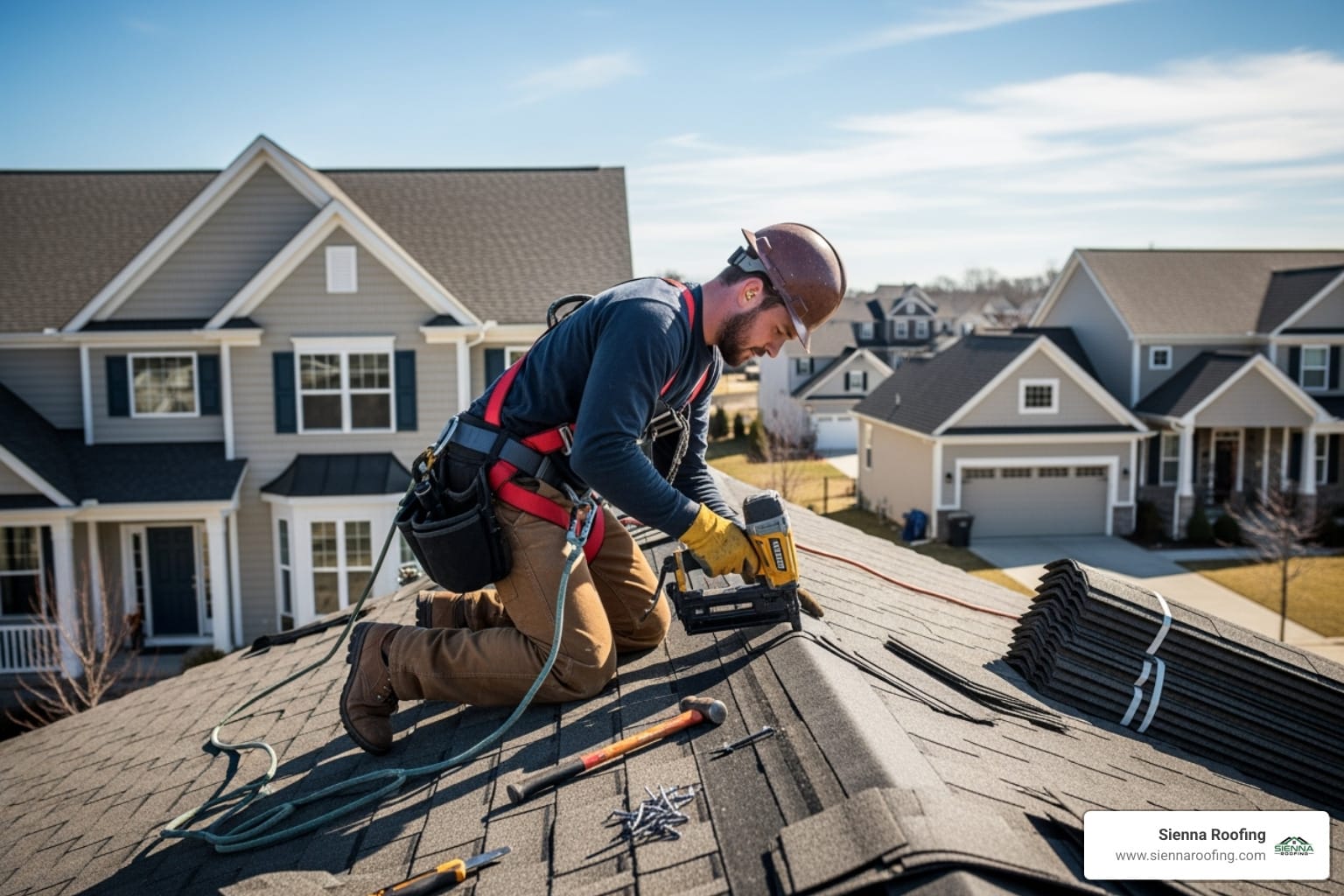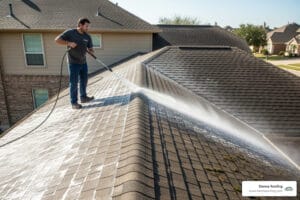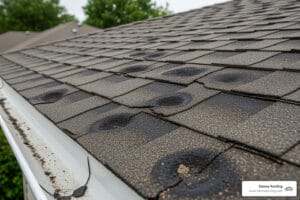Roof Contractor Near Me: Data-Backed Guide to Choosing the Right Pro
When you start searching for a roof contractor near me, you’re starting on a crucial task to protect your most valuable asset: your home. A high-quality roof is far more than just a cover; it’s your home’s primary shield against relentless sun, torrential rain, high winds, and hail. Choosing the right expert is the single most important factor in ensuring your roof’s longevity and performance for decades to come. For homeowners in the Houston area, this decision is even more critical due to the region’s demanding climate, which includes everything from hurricane-force winds to intense UV radiation. Securing dependable help begins with understanding what separates a true professional from the rest.
Investing in a quality roof is also a sound financial decision. According to the 2024 Cost vs. Value Report, a midrange asphalt shingle roof replacement in the West South-Central region (which includes Houston) can recoup approximately 61% of its cost at resale. This significant return on investment underscores the importance of getting the job done right the first time. A poorly installed roof not only fails to add value but can lead to costly repairs that diminish your home’s worth. If you prefer a local team with deep Texas experience, consider working with a trusted roofing and solar company in Sugar Land like Sienna Roofing for start-to-finish guidance.
Quick Guide to Finding Local Roof Contractors:
- Check Online Reviews & Ratings – Look for consistent, detailed feedback on platforms like Google, the Better Business Bureau (BBB), and local directories.
- Verify All Credentials – A non-negotiable step. Confirm their state licensing, general liability insurance, and worker’s compensation coverage.
- Get Multiple Detailed Quotes – Don’t just compare prices. Compare the scope of work, materials specified, and warranty terms from at least three contractors.
- Ask for Local References – Speak directly with recent customers in your area to get unbiased feedback on their experience.
- Review Warranties Thoroughly – You need to understand what’s covered by both the material manufacturer and the contractor’s workmanship guarantee.
I’m Andre Castro, CEO and founder of Sienna Roofing & Solar. With over five years of dedicated experience and a background in Construction Management from Texas A&M University, my mission is to bring a higher level of professionalism and transparency to the roofing industry. I’m here to share what separates exceptional contractors from the rest, helping you make an informed and confident decision.
Is It Time for a New Roof? 7 Telltale Signs (Backed by Data)
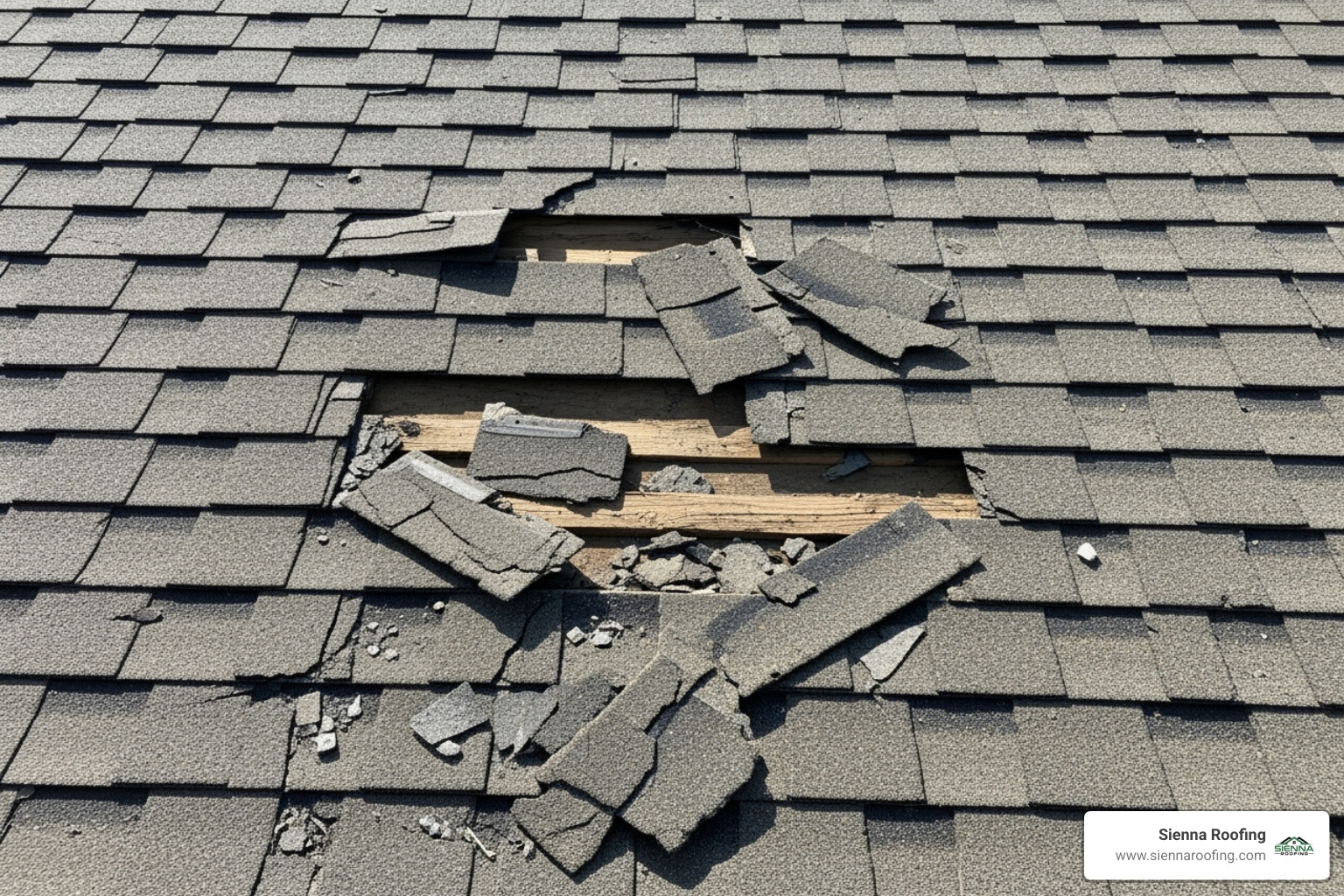
Your roof works tirelessly around the clock, but it won’t last forever. Most asphalt shingle roofs have a 20-25 year lifespan, but this can be shortened by severe weather or improper installation. Recognizing warning signs early can save you from the headache and expense of widespread water damage, mold growth, and structural decay. If you notice any of the following issues, it’s time to find a qualified roof contractor near me for a professional inspection.
-
Your Roof’s Age: If your asphalt shingle roof is over 20 years old, it’s living on borrowed time. Even if it looks acceptable from the ground, its materials may have become brittle and less effective. It’s wise to start budgeting for a replacement rather than waiting for a catastrophic failure.
-
Curling, Cracking, or Buckling Shingles: Look closely at the shingles. Are the edges curling upwards or are the tabs buckling in the middle? Are there visible cracks? These are signs that the shingles have reached the end of their functional life, often due to heat and sun exposure, and are no longer providing a watertight seal.
-
Missing Shingles: A few missing shingles after a major windstorm might seem like a minor issue, but each bare spot is a direct entry point for water. This can quickly lead to leaks and damage to the underlying roof deck. It’s a clear signal that your roof is vulnerable.
-
Excessive Granules in Gutters: Check your gutters and downspouts for an accumulation of shingle granules, which look like coarse black sand. These granules are a protective layer that shields the asphalt from damaging UV rays. When they wear off, the shingle deteriorates rapidly. A few granules are normal, but a large accumulation is a red flag.
-
Leaks, Drips, or Water Stains: The most obvious sign of a problem is water inside your home. Look for brown or yellow stains on ceilings and walls, especially in upper-floor rooms. It’s also crucial to inspect your attic with a flashlight for signs of moisture, dark wood, or a musty smell, as leaks can exist for months before they become visible indoors.
-
Moss or Algae Growth: While common in humid climates like Houston’s, dark streaks (algae) or patches of moss on your roof are more than just a cosmetic issue. Moss traps moisture against the shingle surface, which can cause decay and lift the shingles, making them susceptible to wind damage.
-
A Sagging Roof Deck: This is the most serious red flag and requires immediate attention from a professional. A sagging or drooping appearance indicates a potential structural failure of the underlying roof deck, often caused by chronic water damage that has rotted the wood. Do not delay if you see this.
Spotting these signs gives you time to plan. When you talk with an estimator, you can discuss the scope, materials, and timeline to budget confidently and prevent small issues from turning into major structural damage.
How to Find a Reputable Roof Contractor Near Me (And Avoid Costly Mistakes)
Finding a qualified professional requires careful vetting to ensure your significant investment is protected. Rushing the decision or hiring the cheapest bidder can lead to disastrous consequences. Breaking the process down into manageable steps helps you identify trustworthy, skilled, and reliable contractors.
Vetting Your Local Options
Start by building a list of at least three to five solid candidates. This involves some detective work to separate the established pros from the fly-by-night operators who often appear after storms.
- Check Reviews and Ratings: Go beyond a simple star rating. Dive into comments on Google, Yelp, and Angi. Look for patterns in praise (excellent communication, meticulous cleanup, on-time crew) or complaints (missed deadlines, surprise costs, poor workmanship). Pay special attention to BBB Accredited roofing contractors, as an A+ rating indicates a long-term commitment to ethical business practices and customer satisfaction.
- Ask for Local Referrals: Friends, family, and neighbors who have recently had roof work done can provide the most honest feedback. Ask them specific questions: “Did the final cost match the estimate?” “How did they handle unexpected problems?” “Was the project manager responsive?” “Would you hire them again without hesitation?”
- Verify License and Insurance (Critically Important): A legitimate contractor will readily provide proof of general liability insurance and worker’s compensation insurance. General liability protects your property from damage, while worker’s comp protects you from being sued if a worker is injured on your property. Don’t just look at the certificate—call the insurance provider to verify that the policies are active and provide adequate coverage.
- Confirm Local Presence: A contractor with an established local office and a history in your community has a reputation to uphold. Be extremely wary of door-to-door “storm chasers.” These companies often use high-pressure sales tactics, perform subpar work with cheap materials, and then vanish, leaving you with a worthless warranty.
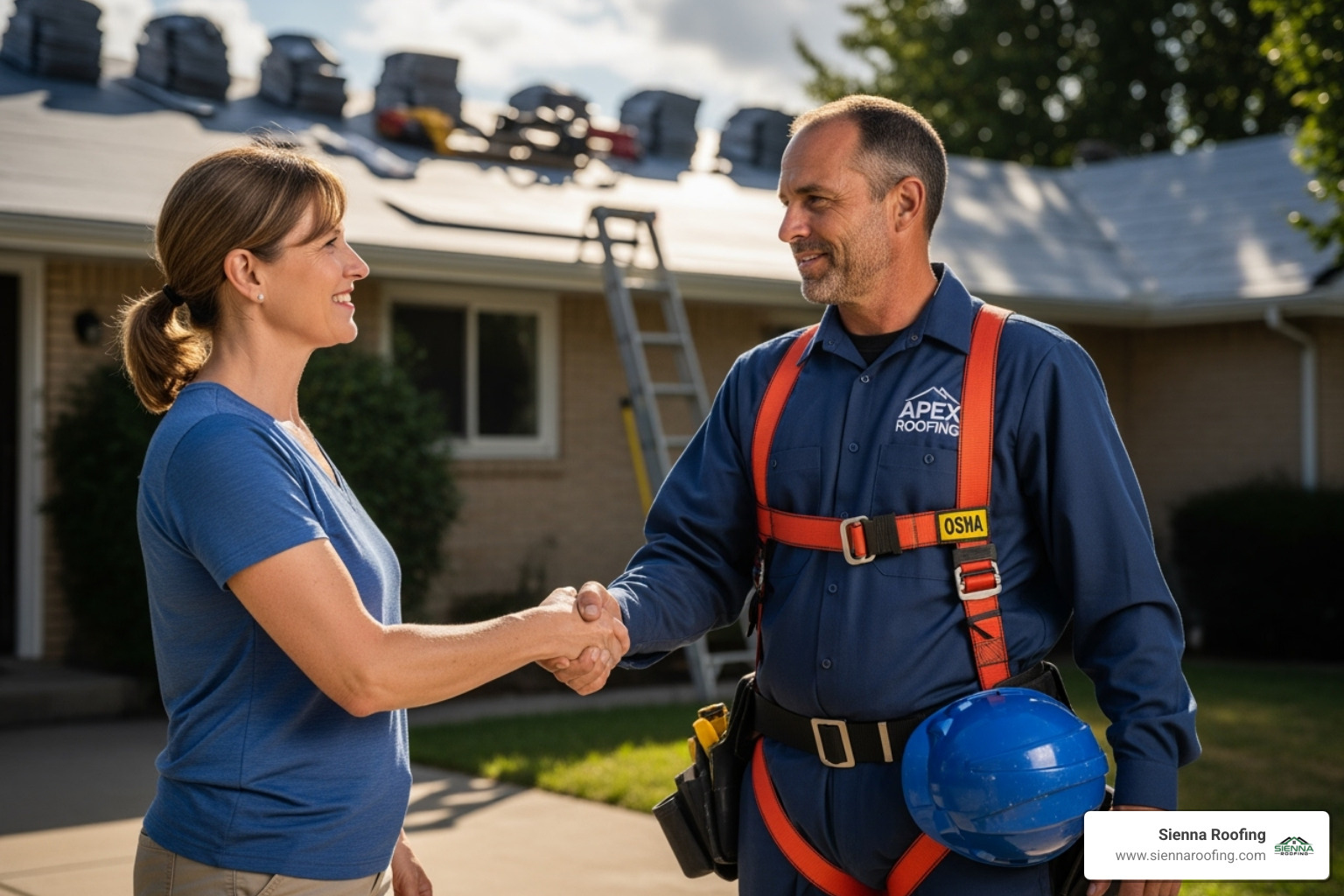
The Importance of Certifications and Warranties
Manufacturer certifications from top brands like GAF or Owens Corning are a powerful indicator of quality. These are not easy to obtain. They prove a contractor has been professionally trained to install products according to the manufacturer’s strict specifications. Hiring a certified contractor like a GAF Master Elite® contractor can provide access to improved warranties that cover both materials and workmanship for extended periods. This is a huge advantage, as standard warranties may only cover defective materials, not installation errors. Fewer than 2% of roofing contractors nationwide earn GAF Master Elite® status, a signal of rigorous standards, financial stability, and consistent performance. You can view a comprehensive guide on shingle styles and technology to learn more about quality materials. For more details on our commitment to quality, you can find more info about our certifications.
Key Questions to Ask Your Potential Roofer
Arm yourself with these questions to make an informed decision. A true professional will welcome them.
- How long have you been in business under this name? Longevity indicates stability and experience. A new company isn’t necessarily bad, but an established one has a proven track record.
- Can I see your license and proof of insurance? If they hesitate, show you an expired certificate, or can’t provide it, this is a major red flag. Move on immediately.
- Do you use subcontractors? It’s a common practice, but you need to know. If so, ensure they are also fully licensed and insured. The primary contractor should take full responsibility for their work.
- What is the project timeline and how do you handle weather delays? A professional will have a clear communication process for keeping you updated on progress and any schedule changes.
- How do you handle unexpected damage found during the tear-off? Ask about their process for documenting issues (e.g., rotten decking), communicating with you, and getting your approval for any additional work and associated costs via a change order.
- What does your workmanship warranty cover and for how long? Get specific details in writing. This is separate from the material warranty and covers installation errors, which are the cause of most roof failures.
- Can you provide a detailed, itemized written estimate? This is essential for comparing quotes fairly. It should break down costs for labor, materials, permits, and debris removal to avoid surprise fees.
Roofing Services and Costs: What Professionals Charge and Why
Roofing isn’t a one-size-fits-all service. From minor fixes to complete overhauls, professionals offer a range of solutions custom to your home’s specific condition. Understanding these services and their associated costs helps you make smart, informed decisions. While typical repairs in the Houston area average between $380 and $1,800, the final price depends entirely on your specific needs. Nationally, homeowners spend roughly $6,700–$14,000 on a new asphalt shingle roof, with local averages often falling around $9,000–$10,000 depending on size, materials, and complexity (see the average roof replacement cost).
Common Roofing Services
A comprehensive roof contractor near me offers a full suite of services to address any issue, big or small. These typically include:
- Roof Inspections: A thorough assessment is the foundation of any good roofing plan. A professional inspection should include examining the roof surface, flashing around chimneys and vents, the condition of the underlayment (if visible), attic ventilation, and the state of your gutters.
- Roof Repair: This is a cost-effective solution for localized issues like a few missing shingles, damaged flashing, or a minor leak. The key is to determine if the rest of the roof is in good condition. A reputable contractor will tell you honestly if a repair is sufficient or if you’d be better off with a replacement.
- Roof Replacement: When a roof has reached the end of its life or has extensive damage, a complete tear-off and installation of a new roofing system is necessary. This is a major project but ensures decades of protection.
- Guttering Replacement: Gutters are a critical,, part of your roof’s water management system. Clogged or damaged gutters can cause water to back up under your shingles, rotting the fascia boards and even damaging your home’s foundation.
- Emergency Roof Repair: Immediate service after severe storms is vital. This often involves installing a temporary tarp to secure your home and prevent further water intrusion while a permanent repair plan is developed.
- Commercial Roofing: Specialized services for business properties, which often involve different materials (like TPO or EPDM) and flat-roof systems that require unique expertise.
We are proud to offer a complete range of solutions to protect your property. You can view all our roofing services to learn more.
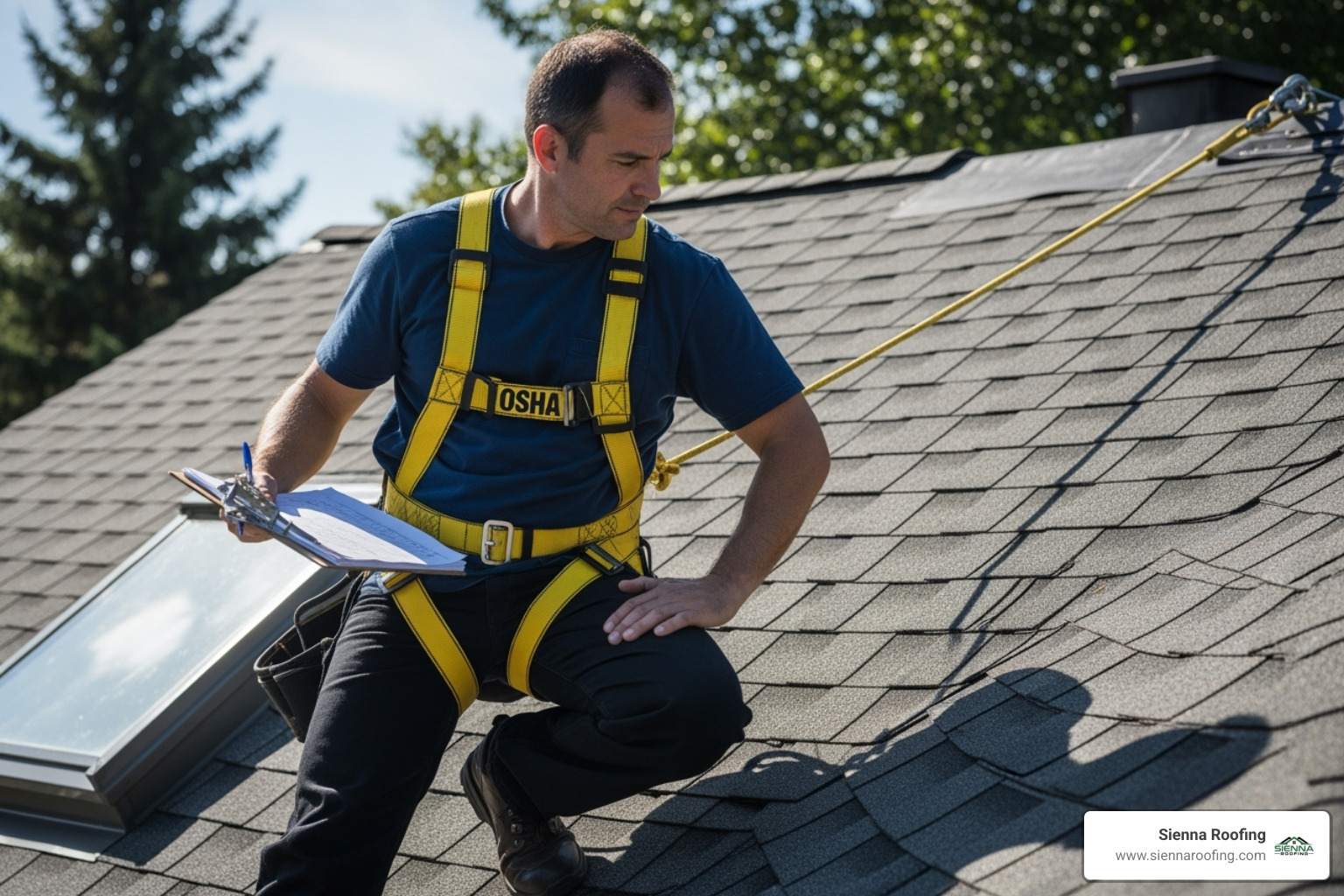
Decoding the Cost: What to Expect
The final price of your roofing project depends on several key factors. A transparent estimate should account for these variables:
- Roof Size and Pitch: Larger roofs naturally require more materials and labor. Pitch, or the steepness of the roof, is also a major factor. A very steep roof requires more safety equipment and slower, more careful labor, increasing the cost.
- Extent of Damage: A few missing shingles may cost $380-$800 to replace. However, fixing a sagging roof can range from $1,500 to $7,000 or more because it involves not just shingles but also replacing rotted structural wood (decking or trusses).
- Material Choices: Architectural asphalt shingles are the most popular choice for their balance of cost, durability, and aesthetics. Metal, tile, or slate offer greater longevity and curb appeal but come at a significantly higher initial cost and may require structural reinforcement.
- Labor Costs: Skilled, experienced, and insured crews command higher wages. While it may be tempting to choose a contractor with low labor costs, this often correlates with lower-quality work, which can lead to premature roof failure and costly future problems.
- Project Complexity: Features like skylights, chimneys, multiple roof facets, and valleys all add time and complexity to the project, which increases the cost. Tearing off multiple existing layers of old shingles will also add to the labor and disposal fees.
- Permit Fees: Most roof replacements require a permit from your local municipality to ensure the work meets building codes. A professional contractor will handle the entire permitting process for you and include the fee in the estimate.
Steer Storm Damage Like a Pro: Insurance Claims and Prep Tips
Once you’ve chosen a roof contractor near me, knowing what to expect during the project can make the entire experience feel more manageable. Good communication and a little preparation on your part can help create a smooth and successful partnership, especially when dealing with the stress of storm damage.
Handling Storm Damage and Insurance Claims
After a severe storm, acting quickly is crucial to prevent further damage and streamline your insurance claim. Wind and hail are top drivers of homeowners insurance losses in the U.S., so meticulous documentation is your best tool. For context on the frequency of these events, see the Insurance Information Institute’s latest wind and hail losses data.
- Document Everything Immediately: As soon as it’s safe, take clear photos and videos of all visible damage. Get close-ups of dented gutters, cracked siding, and hail-bruised shingles. Also, take wider shots to show the overall context. Note the date and time of the storm. This evidence is vital for your claim.
- Contact Your Insurer Promptly: Report the damage to your insurance company as soon as possible to get the claims process started. Have your policy number and documentation ready. They will assign an adjuster to inspect the damage.
- Get a Professional Estimate and Meet the Adjuster: This is a critical step. Have your trusted contractor perform their own thorough inspection and prepare a detailed estimate. Ideally, your roofer should be present when the insurance adjuster visits. They speak the same technical language and can point out damage the adjuster might overlook, ensuring that all necessary repairs are included in the claim scope. This helps you get a fair settlement that covers the full cost of a proper restoration.
- Avoid Signing Premature Contracts: Be wary of any roofer who pressures you to sign a contract before your insurance claim has been approved. A reputable contractor will work with you and your insurance company to agree on the scope and cost first.
We help coordinate inspections and estimates so you can move from damage to resolution as efficiently as possible.
Preparing Your Home for Roofing Work
A little prep work protects your property and helps the crew work safely and efficiently.
- Clear the Perimeter: Move vehicles far from the driveway. Relocate patio furniture, grills, potted plants, and any yard decor away from the house to create a safe work zone and prevent damage from falling debris.
- Protect Your Landscaping: Cover delicate plants, flowers, and shrubs near the foundation with tarps. If you have low-hanging tree branches over the roof, consider having them tied back or trimmed.
- Secure Interior Items: The hammering and activity on the roof will cause vibrations throughout the house. Remove pictures, mirrors, and other valuables from walls and shelves, especially in rooms on the top floor, to prevent them from falling.
- Plan for Noise and Pets: A roof replacement is loud. For their comfort and safety, keep pets in a secure, quiet space indoors or arrange for them to stay with a friend or at a daycare during work hours.
- Notify Your Neighbors: As a courtesy, let your immediate neighbors know that the work will be happening. This gives them a heads-up about the noise and the presence of a work crew and dumpster.
Sugar Land’s Local Roofing Experts: Fast, Weather-Ready Solutions
When searching for a roof contractor near me in the Houston area, local expertise is not just a benefit—it’s a necessity. The Texas Gulf Coast climate, with its intense summer heat, high humidity, hail storms, and potential for hurricane-force winds, requires specialized knowledge to build a roof that lasts. At Sienna Roofing, we are based in Sugar Land because we are dedicated to understanding and meeting the unique challenges faced by Texas homeowners.
What sets us apart as your local roofing partner:
Our local expertise means we know which materials and installation techniques stand up to the local weather. We recommend shingles with high wind ratings, algae-resistant technology, and proper ventilation systems to combat attic heat and moisture buildup. This custom approach ensures your roof is not just replaced, but truly upgraded.
We specialize in both residential and commercial roofing, delivering exceptional results for any project, large or small. Our commitment extends to offering comprehensive roofing and solar solutions that protect your property while helping you reduce energy costs—a major benefit in the Texas heat. Our service area covers the greater Houston region, including Missouri City, Katy (see our dedicated roofer in Katy), Richmond, and Pearland, allowing us to provide prompt, reliable service to our neighbors.
We stand behind our work with a 100% satisfaction guarantee. This isn’t just a slogan; it’s our promise that the job is not complete until you are fully satisfied with the quality of our work and the professionalism of our team. When you choose us, you gain a long-term partner invested in your home’s protection.
Visit us or call to discuss your roofing needs:
Sienna Roofing
17034 University Blvd, Sugar Land, TX 77479
Phone: (832) 564-3322
FAQ: Materials, Lifespan, and Maintenance for Your Roof
It’s natural to have questions when considering a major home improvement project like a roof replacement. Here are detailed answers to some of the most common concerns we hear from homeowners in the Sugar Land and Houston area.
What are the different types of roofing materials?
Each roofing material offers a unique blend of aesthetics, durability, and cost. The right choice depends on your goals and budget.
- Asphalt Shingles: The most popular choice in North America. Modern architectural (or dimensional) shingles offer a rich, textured look and are more durable than older 3-tab shingles. They provide a great balance of cost-effectiveness and versatility with a lifespan of 20-25 years.
- Metal Roofing: Highly durable, fire-resistant, and energy-efficient, often lasting 40-70 years. Options include standing seam panels for a modern look or metal shingles that mimic other materials. The upfront cost is higher, but the longevity can make it a worthwhile investment.
- Tile Roofing: Made from clay or concrete, tile offers exceptional durability (50-100+ years) and a distinctive look suited for Mediterranean or Spanish-style homes. However, tile is very heavy and requires a robust roof structure to support its weight.
- Slate Roofing: A premium, natural stone option with unparalleled longevity (100+ years) and timeless beauty. It is the most expensive and heaviest option, representing a significant investment in your home.
A qualified roof contractor near me can walk you through these options and help you choose the best material for your home’s style, budget, and the local climate.
How can I extend the lifespan of my current roof?
Proactive care can add years to your roof’s life and help you avoid premature replacement. Key maintenance steps include:
- Regular Inspections: At least once a year (and after every major storm), perform a visual inspection from the ground. A professional inspection every 2-3 years can catch subtle issues that untrained eyes might miss.
- Keep Gutters Clean: Clogged gutters cause water to back up against the edge of the roof, which can rot the wooden fascia boards and roof decking. This is one of the most important and easiest maintenance tasks.
- Trim Overhanging Branches: This prevents physical damage from falling limbs during a storm and also reduces the amount of leaves and moisture-trapping debris that accumulates on your roof.
- Address Minor Issues Promptly: Fixing a single missing shingle or a small piece of damaged flashing is a minor repair. Ignoring it can allow water to penetrate, turning a small issue into a major problem.
For additional best practices, review the NRCA homeowner maintenance tips.
What should be included in a detailed roofing contract?
A contract is your legal protection, so it must be thorough. Never accept a one-page estimate as a final contract. A proper agreement should include:
- Full Business Information: The contractor’s full name, address, phone number, and license number.
- Detailed Scope of Work: It should specify a full tear-off of old roofing, replacement of any damaged decking (with the cost per sheet specified), installation of new underlayment and flashing, and the specific roofing material to be installed.
- Specific Materials: The contract should list the brand, type, and color of shingles, underlayment, and other components.
- Payment Schedule: A clear breakdown of the total cost, deposit amount, and payment schedule. Be wary of contractors who demand a large percentage of the cost upfront.
- Project Timeline: Estimated start and completion dates, along with a clause addressing how weather delays will be handled.
- Warranty Information: Details on both the manufacturer’s material warranty and the contractor’s workmanship warranty.
- Proof of Insurance: The contract should state that the contractor carries both general liability and worker’s compensation insurance.
- Cleanup and Debris Removal: Confirmation that the contractor is responsible for cleaning the site and hauling away all debris.
Ready to Protect Your Home? Hire a Proven Roof Contractor Near You
Choosing the right roof contractor near me is one of the most important decisions you’ll make as a homeowner. It’s a choice that directly impacts the safety, value, and integrity of your home. The difference between a quality, professional contractor and one who cuts corners can mean decades of security versus years of frustrating leaks and expensive repairs.
This guide has shown that smart homeowners act early on warning signs, thoroughly vet contractors by checking licenses, insurance, and local references, and insist on a detailed contract that protects their interests. By understanding the full scope and costs of the project and knowing how to steer the process—from insurance claims to home preparation—you can transform a potentially stressful event into a smooth, successful collaboration.
An investment in a reputable contractor pays dividends for years to come. You get more than just new shingles; you get the peace of mind that comes from knowing your home is protected by skilled professionals who use quality materials and stand behind their work with meaningful, long-term warranties. When the next Texas storm rolls through, you’ll rest easy under a roof built to last.
Don’t wait for small problems to become expensive emergencies. If your roof is showing signs of wear, has suffered storm damage, or is approaching the 20-year mark, taking proactive steps now is the wisest and most cost-effective move you can make.
Ready to protect your home with workmanship you can trust? Contact Sienna Roofing today for a free, no-obligation estimate! We’re here to provide the personalized, community-driven service that Sugar Land and Houston homeowners deserve, backed by our 100% satisfaction guarantee.
